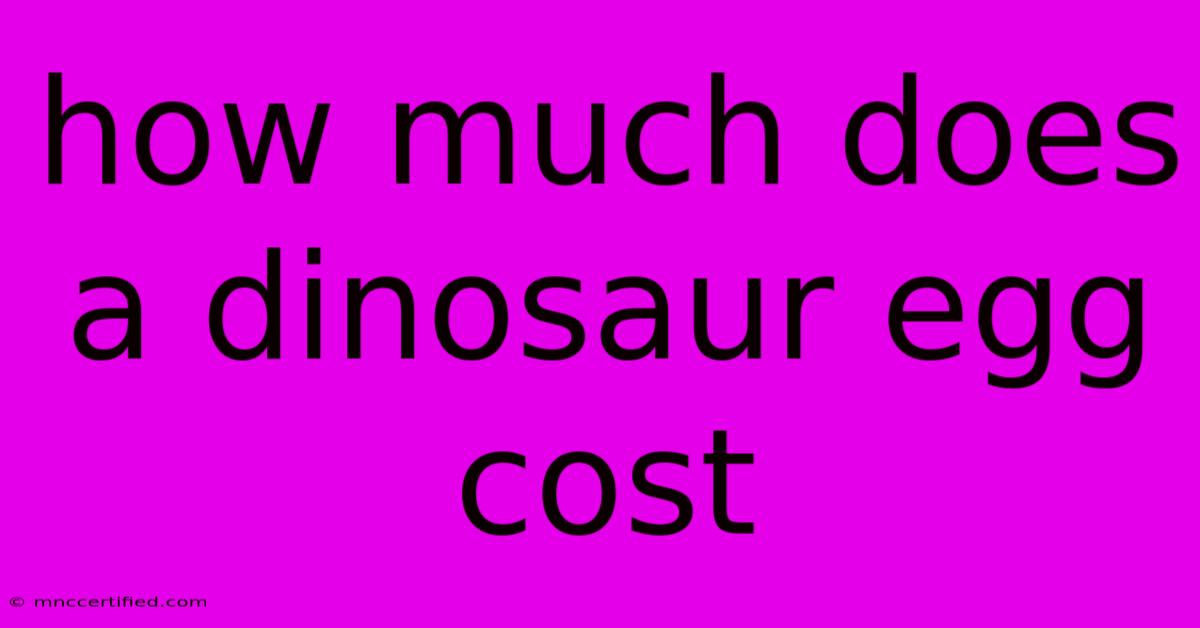How Much Does A Dinosaur Egg Cost

Table of Contents
How Much Does a Dinosaur Egg Cost? A Deep Dive into Fossil Prices
The question, "How much does a dinosaur egg cost?" isn't easily answered with a single price tag. The value of a dinosaur egg fossil varies wildly depending on several key factors. This article will explore these factors, providing you with a clearer understanding of the market and the significant price range involved.
Factors Affecting the Price of Dinosaur Eggs
Several crucial elements determine the cost of a dinosaur egg fossil, impacting its value from a few thousand dollars to millions.
1. Species and Completeness: The Rarity Factor
The species of dinosaur is paramount. Eggs from rare species, like those of Oviraptor or Tyrannosaurus rex, command significantly higher prices than more common finds. The completeness of the egg also plays a crucial role. A perfectly preserved, complete egg will fetch a much higher price than a fragmented or damaged one. Think of it like a rare stamp collection; the condition drastically impacts value.
2. Authenticity and Provenance: Verifying Legitimacy
The authenticity of the fossil is non-negotiable. A fake or fraudulently obtained egg is essentially worthless, regardless of its apparent condition. Provenance, or the documented history of the egg's discovery and ownership, is equally vital. A clear chain of custody boosts confidence and significantly increases value. This documentation ensures buyers aren't inadvertently purchasing illegally obtained fossils.
3. Size and Preservation: Condition is Key
The size of the egg matters. Larger, more complete eggs generally command higher prices. The preservation quality is crucial; beautifully preserved eggs with visible shell textures and internal structures are prized. Eggs with evidence of fossilized embryos are incredibly rare and valuable, often becoming museum-worthy pieces.
4. Market Demand and Collector Interest: Supply and Demand Dynamics
Like any collectible item, market demand plays a significant role. The current popularity of dinosaur fossils and the number of serious collectors actively seeking them directly influence prices. Specific features like the presence of embryonic remains or exceptionally well-preserved shell textures increase demand among collectors and museums, driving up costs.
5. Location of Discovery and Legal Acquisition: Avoiding Illegal Trade
The location of discovery can impact the price, particularly if it's a location known for significant paleontological finds. Crucially, legal acquisition is paramount. Purchasing eggs from reputable sources with proper permits and documentation ensures you aren't contributing to the illegal fossil trade, which devastates paleontological research and conservation efforts. Buying from established auction houses or reputable dealers minimizes this risk.
Price Range: From Affordable to Astronomical
Given the factors above, providing a precise price is impossible. However, we can offer a general range:
- Lower End: Fragments or incomplete eggs from common species might cost a few thousand dollars.
- Mid-Range: Well-preserved, complete eggs from less rare species could range from tens of thousands to hundreds of thousands of dollars.
- High End: Exceptionally rare and complete eggs from sought-after species, particularly those containing fossilized embryos, can sell for millions of dollars at auctions.
Conclusion: More Than Just a Fossil
Owning a dinosaur egg is more than just acquiring a collectible; it’s acquiring a piece of prehistoric history. But the cost reflects not just its age but also its rarity, condition, and legal acquisition. Thorough research and a purchase from a reputable source are vital to ensuring a legitimate and valuable addition to any collection. Remember to always prioritize ethical sourcing and support responsible paleontological practices.

Thank you for visiting our website wich cover about How Much Does A Dinosaur Egg Cost. We hope the information provided has been useful to you. Feel free to contact us if you have any questions or need further assistance. See you next time and dont miss to bookmark.
Featured Posts
-
When Does I M A Celebrity 2024 Air
Nov 18, 2024
-
I M A Celebrity Barry Mc Guigans Story
Nov 18, 2024
-
Wales Australia Rugby Live Score
Nov 18, 2024
-
Make America Great Again Gold Hat
Nov 18, 2024
-
Roy Keane On Daughters You Re Kidding
Nov 18, 2024